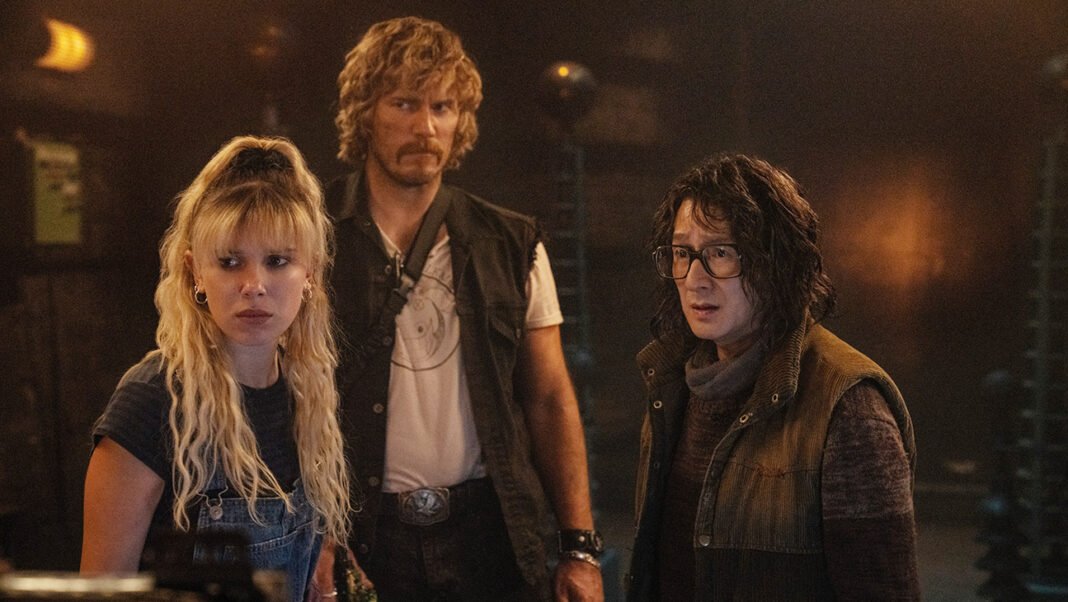The Electric State promised big adventure and even bigger action during a panel at New York Comic Con, which showed off Anthony and Joe Russo’s latest Netflix film.
The footage and discussion with creatives and cast — including Chris Pratt and Millie Bobbie Brown — was presented to an electric crowd at the Empire Stage on Thursday, hours after a new teaser trailer dropped online.
The film hits Netflix March 16 and is a spin on Simon Stålenhag’s graphic novel, which explores a battle between man and intelligent machine set in the ‘90s.
Electric State follows Michelle (Brown), a young woman with a sweet, but mysterious robot who teams up with eccentric drifter Keats (Pratt) for a cross-country expedition to find her brother in a retro-futuristic U.S., where an uneasy peace has settled following a human and AI war.
Joe, who jokingly shared that he’s “exhausted” with his current slate of work (which includes a pair of upcoming Avengers movies), noted that he and Anthony began work on the project five years ago, and were pleased to reunite with some of their Avengers: Endgame collaborators, including Pratt, Anthony Mackie and writers Christopher Markus Stephen McFeely.
“It’s a real passion project. We’re very, very excited to bring it to audiences. It’s massive in scale. We love telling very big stories,” said Joe.
Pratt shared that before taking the script, he had “100 percent” planned to take time off, but getting to re-team with previous collaborators and the story grabbed him.
“It’s not the kind of thing that typically gets made to be a blockbuster style movie like this. It’s so original, it’s a huge swing,” Pratt explained. “I thought that these types of movies might be my last opportunity to be in a big movie like this. I have to look at every opportunity like that. And I did. It’s just such a great story. I was moved to tears reading.”
In terms of how the Russos approached this adaptation, Anthony pointed to the “fascinating” art of Stålenhag’s graphic novel, and likened the experience to adapting Marvel Comics properties for Captain America: Winter Soldier, Captain America: Civil War, Avengers: Infinity War and Endgame.
“We just looked at the images, and the story that he unfolds in the graphic novel. It is very opaque. It’s kind of hard to understand it. You get it in glimpses,” said Anthony. “You can tell there’s a much larger world behind what he’s telling you in the graphic novel that you can only guess at.”
Part of the challenge was telling one story in a two-hour feature rather than in a more expansive graphic novel. “You have to get much more specific about the narrative, so we had a great, great fun, sort of diving in and using his incredible artwork as inspiration to figure out what kind of story we can tell this world,” said Anthony.
Joe and Anthony came up in the industry on TV shows like Arrested Development and Community. Joe noted there are a lot of Community-esque elements in the film, along with timely conversations and issues.
“Imagine a 1990s where, in the late ’50s, Disney animatronics became sentient and then started demanding equal rights,” said Joe. “That’s what, that’s where the war comes out. It cherry picks the ’90s in a way that supports that storytelling and supports the theme of the movie.”
Added Pratt about the time period: “It’s a ‘90s that is reflective of our modern world.” A behind-the-scenes clip saw Pratt and Brown showing off the various props and production design elements that speak to the film’s ‘90s nostalgia like Big Mouth Billy Bass, Cabbage Patch Kids, Barbie, VHS, and Beanie Babies. It emphasized how the film will pay tribute to the era, while mixing in modern tech and issues.
In terms of what the directors were trying to evoke, Joe noted that they were inspired by the ‘80s movies of Amblin or Robert Zemeckis, along with Alan Silvestri’s scores, pointing to Back to the Future.
Later, Brown revealed she had little prep between shooting this and another movie, but did take time to think about what she wanted her “angsty teen” character to evoke, sending in photos of Drew Barrymore in the ‘90s. “I had never done anything like this before,” Brown said. “It was very different. As an actor, it challenged me… The Russos did such a beautiful job in directing my trajectory … I kept going back to the Russos, ‘how do you want me to play this and that?’ We really found it together.”
New footage showed Brown and Pratt’s character carried around in an old volkswagen van by Herman, Keats’ giant robot friend (voiced by Anthony Mackie). As Keats recalls why he has trust issues and how the two ended up meeting and saving each other in the robot wars, they stumble upon a seemingly abandoned mall. But they soon discover it’s not abandoned when they’re attacked and approached by a new robot after their van has flipped.
After the clip, Joe spoke about bot Herman’s backstory, and revealed more about the leading roles the robots and humans will play in the film. “What’s interesting about all the lead characters in the movie is that they all have some trauma in their lives that they’re running from,” he said. “They’re all dropouts in their own way. Technology’s really pervasive in the movie, but none of them want to participate in it, and they found their own way to escape it. Herman is a dropout. He’s dropped out of robot society. Doesn’t participate in it… they live off the grid and on the run from the law together.”
Brown and Pratt also spoke to how working with motion capture and other technology created fun challenges. “ I have a huge amount of gratitude to the Russos, but also the mocap actors and team that helped build the world so we didn’t have to do most of the work,” Brown said.
In addition to Pratt and Brown, the film also stars Ke Huy Quan, Stanley Tucci, Jason Alexander, Giancarlo Esposito, and Woody Norman, with Woody Harrelson, Mackie, Brian Co, and Jenny Slate lending their voices to the film’s leading robots. While discussing the film, the directors spoke about The Electric State’s cast, addressing their love for ensembles.
“We are big fans of ensemble storytelling. You can see it in all of our work: our smaller movies, our bigger movies, our television work. We think it’s because we came from a big Italian American family where there were lots of people in small rooms together, talking loudly all the time,” said Anthony. “You just develop a sense of community and an appreciation for the variety of voices that contribute to your experience.”
To close out the panel, Brown shared a heartfelt message about the importance of families having escapist films to watch, something the Russos touched on at the start of the panel. “It truly takes you on a journey,” she said. “Escapism is huge, and I think it’s so lovely for families to have that moment where they’re able to take themselves out of this world that is so scary and put themselves into a world that is so transformative.”


